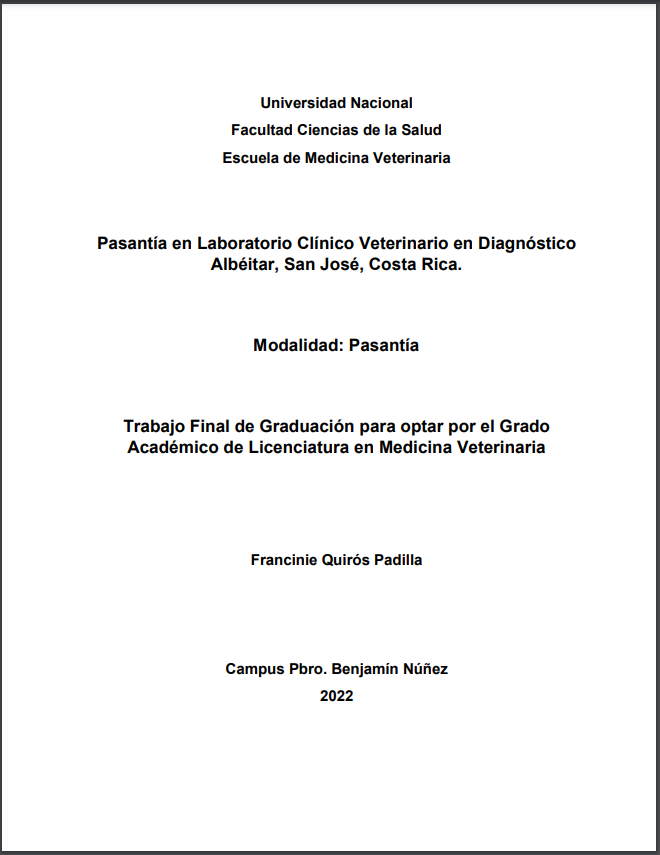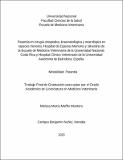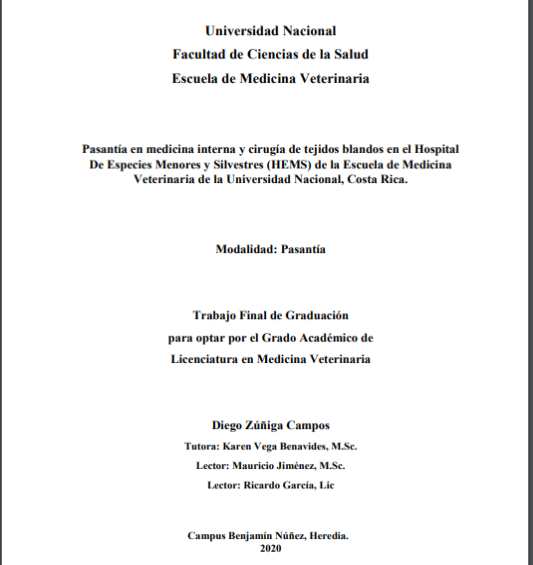| dc.contributor.advisor | Beita Carvajal, Gabriela | |
| dc.contributor.author | Ulloa Dobles, Irene | |
| dc.date.accessioned | 2021-05-04T20:37:10Z | |
| dc.date.available | 2021-05-04T20:37:10Z | |
| dc.date.issued | 2020 | |
| dc.identifier.uri | http://hdl.handle.net/11056/19323 | |
| dc.description | Modalidad: Pasantía | es_ES |
| dc.description.abstract | La pasantía se realizó en el área de especies menores del North Carolina State
University Veterinary Teaching Hospital (NCSU-VTH) desde el 18 de marzo al 26 de abril
del 2019. En esta institución se participó en tres rotaciones clínicas distintas durante dos
semanas en cada una: servicio de Cirugía de Tejidos Blandos, curso teórico-práctico de
técnicas avanzadas de emergencias y cuidados críticos y servicio de Emergencias y Cuidados
Críticos (ECC), que incluyó la Sala de Emergencias (ER) y la Unidad de Cuidados Intensivos
(ICU). La pasantía continuó en el área de especies menores del Kansas State University
Veterinary Health Center (KSU-VHC) desde el 6 de mayo al 17 de mayo del 2019, en donde
se visitó el servicio de Cirugía de Tejidos Blandos durante dos semanas. El tiempo total de
la pasantía abarcó 320 horas.
Los resultados presentados en este documento se analizaron mediante estadística
descriptiva. En los servicios de Cirugía de Tejidos Blandos se participó en la admisión y
abordaje de 50 pacientes quirúrgicos, que incluyó procedimientos diagnósticos, rondas de
pacientes y las etapas preoperatoria, transoperatoria y postoperatoria de 40 procedimientos
quirúrgicos distintos. En el curso teórico-práctico de ECC se presenciaron 12 charlas de
temas relevantes de ECC y se practicaron 11 técnicas avanzadas de ECC la mayoría en
cadáveres de caninos y felinos. En el servicio de ECC se participó en la admisión y abordaje
de pacientes recibidos en el ER, que abarcó procedimientos diagnósticos, de estabilización y
terapéuticos. En el ICU se asistió a las rondas de pacientes y se presenciaron y aprendieron
diversos procedimientos terapéuticos y de monitorización en los pacientes críticos.
Los procedimientos diagnósticos, quirúrgicos y de emergencias y cuidados críticos
que fueron presenciados durante la pasantía están en línea con los más novedosos avances de
la medicina veterinaria a nivel mundial, como fluoroscopía, tomografía computarizada,
técnicas quirúrgicas mínimamente invasivas y de radiología intervencional. Además, se
llevaron a cabo con materiales, instrumentos y equipo especializado de última tecnología y
por médicos veterinarios especializados altamente calificados y certificados. De esta manera,
se adquirieron conocimientos y destrezas de nivel superior que se podrán aplicar en el
quehacer profesional para realizar un abordaje integral y de calidad en pacientes de cirugía
de tejidos blandos y emergencias y cuidados críticos con el fin de enriquecer y mejorar la
práctica veterinaria en el país. | es_ES |
| dc.description.abstract | The externship took place in the small animal section of the North Carolina State
University Veterinary Teaching Hospital (NCSU-VTH), from March 18th to April 26th,
2019. During this timeframe, I had the opportunity to particpate in three clinical rotations for
a period of two weeks each: Soft Tissue Surgery service, practical course of advanced
emergency and critical care techniques and also the Emergency and Critical Care (ECC)
service, which included the Emergency Room (ER) and Intensive Care Unit (ICU). The
externship continued in the small animal area of the Kansas State University Veterinary
Health Center (KSU-VHC) from May 6th to May 17th, 2019, where I visited the Soft Tissue
Surgery Service for two weeks. A total of 320 hours was completed during the externship.
The results presented in this document were analyzed using descriptive statistics. At
the Soft Tissue Surgery services in both hospitals, I was involved in the admission and
management of 50 surgical patients, which included diagnostic procedures, patient rounds,
and presurgical, surgical, and postsurgical periods of 40 different surgeries. During the ECC
practical course, I attended 12 lectures about relevant ECC topics and performed 11 advanced
ECC techniques in canine and feline cadavers. In the ECC service, I got to be part of the
admission and management of emergency patients received in the ER, which consisted of
diagnostic, stabilization, and therapeutic procedures. In the ICU, I was able to be participate
in the patient rounds, and the different therapeutic and monitoring procedures that were
performed in critical patients, this helped me learn about ICU medicine.
The diagnostic, surgical and ECC procedures that were observed during the externship
are the newest advances in veterinary medicine worldwide, for example, procedures like
fluoroscopy, computed tomography, minimally invasive surgery, and interventional
radiology. Also, they were performed with specialized equipment, materials, and instruments
of the latest technology and by highly qualified and certified specialized veterinarians. This
provided me with superior knowledge and skills that will enable me to perform a better and
more complete management of surgical and ECC cases, with the goal of improving the
quality of veterinary medicine in my country. | es_ES |
| dc.language.iso | spa | es_ES |
| dc.publisher | Universidad Nacional, Costa Rica | es_ES |
| dc.rights | Acceso abierto | es_ES |
| dc.rights | Atribución-NoComercial-CompartirIgual 4.0 Internacional | * |
| dc.rights.uri | http://creativecommons.org/licenses/by-nc-sa/4.0/ | * |
| dc.subject | CIRUGÍA VETERINARIA | es_ES |
| dc.subject | VETERINARY SURGERY | es_ES |
| dc.subject | EMERGENCY VETERINARY MEDICINE | es_ES |
| dc.subject | MEDICINA DE URGENCIAS (VETERINARIA) | es_ES |
| dc.subject | ORTOPEDIA VETERINARIA | es_ES |
| dc.subject | VETERINARY ORTHOPEDICS | es_ES |
| dc.title | Cirugía de tejidos blandos, emergencias y cuidados críticos en especies menores en North Carolina State University Veterinary Teaching Hospital y Kansas State University Veterinary Health Center | es_ES |
| dc.type | http://purl.org/coar/resource_type/c_7a1f | es_ES |
| una.tesis.numero | 10703 | es_ES |
| dc.description.procedence | Escuela de Medicina Veterinaria | es_ES |




